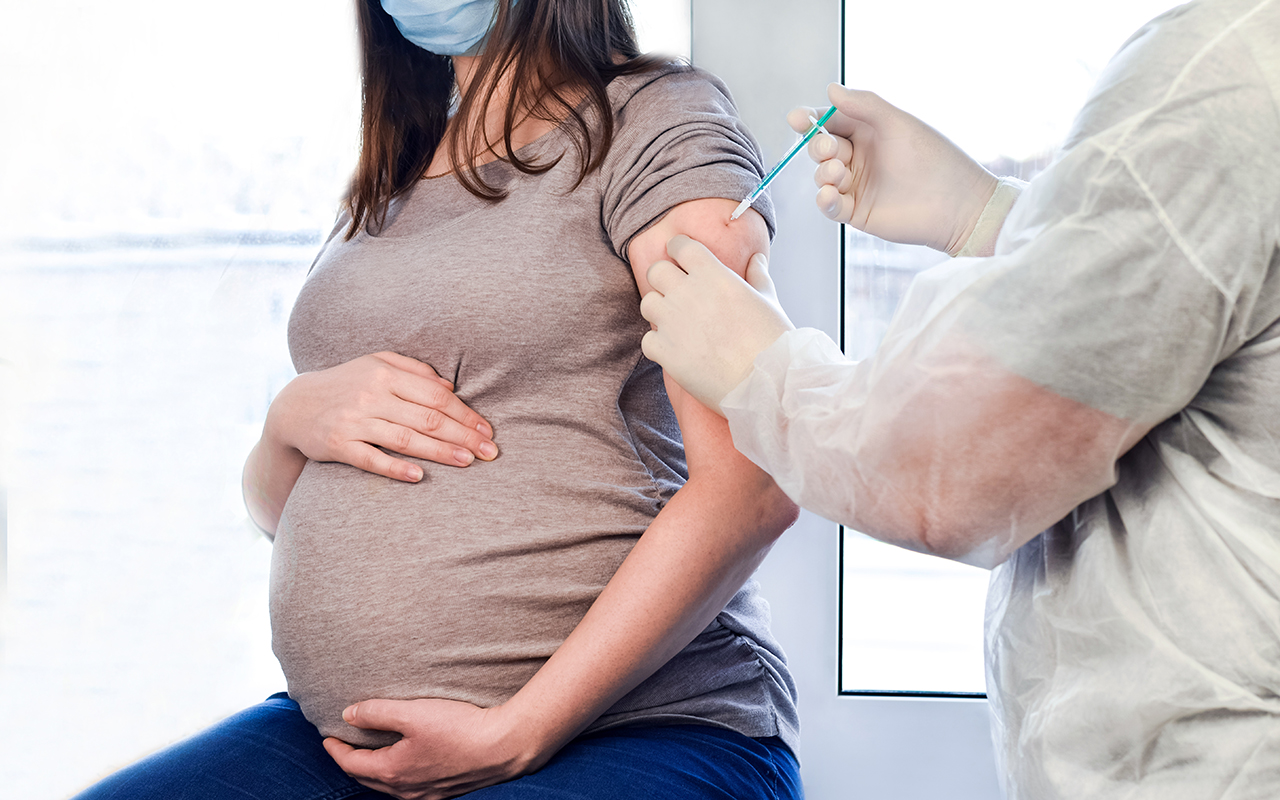PEOPLE who are pregnant are still hesitant about getting vaccinated against COVID-19, but research out of Canada and the US, and the prospect of upcoming Victorian data have given GPs and antenatal care providers more avenues of persuasion.
The Canadian study, published recently in the BMJ, assessed the risk of preterm birth, small for gestational age at birth, and stillbirth for 85 162 births in Ontario between 1 May and 31 December 2021. Just over half of the births occurred in individuals who had received a COVID-19 vaccine during pregnancy.
The result?
“We found no evidence that vaccination during pregnancy with an mRNA COVID-19 vaccine was associated with a higher risk of preterm birth, spontaneous preterm birth, very preterm birth, small for gestational age at birth, or stillbirth,” reported the authors.
“These results — based on more than 43 000 fetuses exposed to at least one dose of mRNA COVID-19 vaccine — did not differ by trimester of vaccination, number of doses received during pregnancy, or mRNA vaccine product.”
In addition, a pre-print study published on Friday by MedRxiv, out of the US and Sweden, showed “COVID-19 vaccination protects against adverse maternal-fetal outcomes with booster shots conferring additional protection against COVID-19 infection”.
“It is therefore important for pregnant people to have high priority status for vaccination, and for them to stay current with their COVID-19 vaccination schedule,” wrote the authors.
Associate Professor Daniel Rolnik, from the Department of Obstetrics and Gynaecology at Monash University, said the latest data were “very reassuring” and confirmed findings of his current research, which is under peer review.
“Our data tells us that in March this year around 85% of pregnant Australians have received at least one COVID-19 vaccination,” A/Professor Rolnik told InSight+. “Some who may have had one or two doses before becoming pregnant are reluctant to have their third or fourth vaccines while pregnant.
“There is still a lot of hesitancy, and that’s about fear of what effect the vaccines may have on fetuses, but the Canadian research and our own confirms what earlier studies have found.
“Pregnancy is in itself a risk factor for severe COVID-19 disease in unvaccinated people,” he said. “Severe COVID-19 increases the chances of stillbirth, preterm birth and other adverse outcomes.
“Getting vaccinated reduces those risks significantly, and the evidence clearly shows that mRNA COVID-19 vaccines are safe for fetuses.”
A/Professor Rolnik confirmed that most of the people in the intensive care unit with COVID-19 in his hospital were either the very elderly with underlying comorbid conditions or unvaccinated pregnant people.
“The first thing for GPs to say to their hesitant pregnant patients is that severe COVID-19 in pregnancy is much worse – for both mother and fetus – than any effects of the vaccines,” he said.
“In all the studies on the vaccines so far there have been no signals of any harms to the fetus.”
He acknowledged that given COVID-19 mRNA vaccines had “not been around that long” follow-up safety evaluations would need to continue into the future.
The Canadian study analysed data from 85 162 births, 43 099 (50.6%) of which occurred in individuals who received one dose or more of a COVID-19 vaccine during pregnancy, with 42 979 (99.7% of the vaccinated group) receiving an mRNA vaccine.
“Vaccination during pregnancy was not associated with any increased risk of overall preterm birth (6.5% among vaccinated v 6.9% among unvaccinated; adjusted hazard ratio 1.02, 95% confidence interval 0.96 to 1.08), spontaneous preterm birth (3.7% v 4.4%; 0.96, 0.90 to 1.03), or very preterm birth (0.59% v 0.89%; 0.80, 0.67 to 0.95),” the authors reported.
“No increase was found in risk of small for gestational age at birth (9.1% v 9.2%; 0.98, 0.93 to 1.03) or stillbirth (0.25% v 0.44%; 0.65, 0.51 to 0.84). Findings were similar by trimester of vaccination, mRNA vaccine product, and number of doses received during pregnancy.”
A multinational study published in April of 2021 in JAMA Pediatrics, found that COVID-19 in pregnancy was associated with “consistent and substantial increases in severe maternal morbidity and mortality and neonatal complications when pregnant women with and without COVID-19 diagnosis were compared”.
“Women with COVID-19 diagnosis were at higher risk for preeclampsia/eclampsia (relative risk [RR], 1.76; 95% CI, 1.27–2.43), severe infections (RR, 3.38; 95% CI, 1.63–7.01), intensive care unit admission (RR, 5.04; 95% CI, 3.13–8.10), maternal mortality (RR, 22.3; 95% CI, 2.88–172), preterm birth (RR, 1.59; 95% CI, 1.30–1.94), medically indicated preterm birth (RR, 1.97; 95% CI, 1.56–2.51), severe neonatal morbidity index (RR, 2.66; 95% CI, 1.69–4.18), and severe perinatal morbidity and mortality index (RR, 2.14; 95% CI, 1.66–2.75),” the authors reported.
“Fever and shortness of breath for any duration was associated with increased risk of severe maternal complications (RR, 2.56; 95% CI, 1.92–3.40) and neonatal complications (RR, 4.97; 95% CI, 2.11–11.69).
“The risk of the [severe neonatal morbidity index] among neonates of women with COVID-19 diagnosis was significantly higher (RR, 2.66; 95% CI, 1.69-4.18) than in those of women without COVID-19 diagnosis. The risk of the [severe perinatal morbidity and mortality index] was more than twice as high in the group of women with COVID-19 diagnosis (RR, 2.14; 95% CI, 1.66–2.75).”
Subscribe to the free InSight+ weekly newsletter here. It is available to all readers, not just registered medical practitioners.

 more_vert
more_vert
UK govt has updated their guidance to a more cautious approach – according to UK govt, ‘sufficient reassurance of safe vaccine in pregnant women cannot be provided at the present time…rule out known or suspected pregnancy…Women who are breastfeeding should also not be vaccinated’.
http://www.gov.uk/government/publications/regulatory-approval-of-pfizer-biontech-vaccine-for-covid-19/summary-public-assessment-report-for-pfizerbiontech-covid-19-vaccine (Aug 2022)
How can this study be unbiased when it has been funded by a manufacturer of the covid vaccine, Pfizer? This is very much a conflict of interest. Regardless of whether this study will eventually be peer reviewed, no pharmaceutical company should be funding research to their own product. Midwives at a major city maternity hospital are sighting far different results regarding safety of mRNA vaccines during pregnancy.